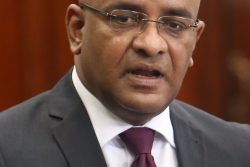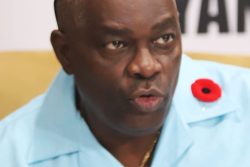Dear Editor,
I think Opposition Leader Aubrey Norton would readily admit that his response at a recent Press Conference that he would release more details on the party’s oil policy “at the right time” could have been better. Not only did his response justifiably provoke legitimate criticism but it also inadvertently damaged the track record of the party on oil and gas matters. Kaieteur News and its publisher, Glenn Lall, led the way in blasting the party from all sides.
The attacks against the party, however, provide the opportunity to raise an issue which I think Mr Lall and others miss or choose to ignore. Mr Lall has often expressed disappointment that the Opposition is not marching on the streets or, I imagine, barricading Parliament for a renegotiated oil agreement. But Mr Lall is aware that in a 2022 poll by the International Republican Institute (IRI), Guyanese ranked oil extraction (at 1 to 2%) behind high prices, unemployment, and corruption in response to the question “What is the most important problem facing our country today?” Cost of living and other quality of life issues surpassed 50%.
Mr Lall, I recall, expressed deep hurt and shock over these results — given that, by then, his newspapers had been making bold headline news of the oil contract almost every day. But the low public interest in a renegotiated oil deal is not a criticism of KN’s efforts. It reflects the Guyanese reality.
What is that reality? Most Guyanese by now realize that oil extraction has not lifted (and will not lift) their living standard under the PPP. People have long concluded that higher revenues from higher royalty rates or ring fencing will not end up in their purses or pockets. Their kitchen tables and cupboards will remain just as empty.
Lall and other advocates are therefore trying to activate a highly skeptical public that is totally untrusting of the PPP government. If citizens were to be asked in a poll tomorrow “Do you think you or your family would enjoy a better life should Guyana get a better oil deal?”, about 90% of respondents would say “No.” Many citizens therefore see no benefit in giving more than moral support to the well-intentioned campaign for a new oil contract. Guyanese are not going to protest in their tens of thousands for more oil revenues under an uncaring, anti-poor, corrupt, and incompetent PPP government. Even the recent spike in public interest since the quarrel over unlimited oil spill liability proves that citizens place their own interest first. More people are paying attention not only because of their moral outrage over the PPP’s senseless and unpatriotic position, but also because they worry that the PPP’s position has the potential to make life in Guyana worse.
In the Gulf States and in Norway, the initial public and political campaigns focused on equitable distribution of new-found oil wealth. In Norway, political parties were even formed with just that single agenda. But, in Guyana, the campaign for a better oil deal is devoid of sustained discussion on how that wealth can and must be used to transform people’s lives. Assume that Guyana gets a better deal tomorrow, then what next? Are citizens in a better place? Do the campaigners fold their tents and stop writing letters and editorials?
Yes, Guyana needs a fair oil deal. The Opposition is however advancing the case that in-hand oil revenues can transform our country, our communities, and our families today. The oil revenue already in the kitty is not a pittance. How could US$ 6-7 billion by 2025 be? It has made Guyana one of the richest countries per capita in the world. A government that believes that national wealth does not belong to the people, however, will take us nowhere.
The Opposition’s proposals on guaranteed liveable income, waivers on GPL and GWI payments for low-income households, rent assistance, expanded micro-small business loans and grants, and comprehensive mother/child support are just some of the ideas on lifting the quality of life of all Guyanese. Apart from being a government’s moral obligation to its citizens and their human right to live decently, such initiatives are also economic investments.
Respectfully,
Sherwood Lowe





